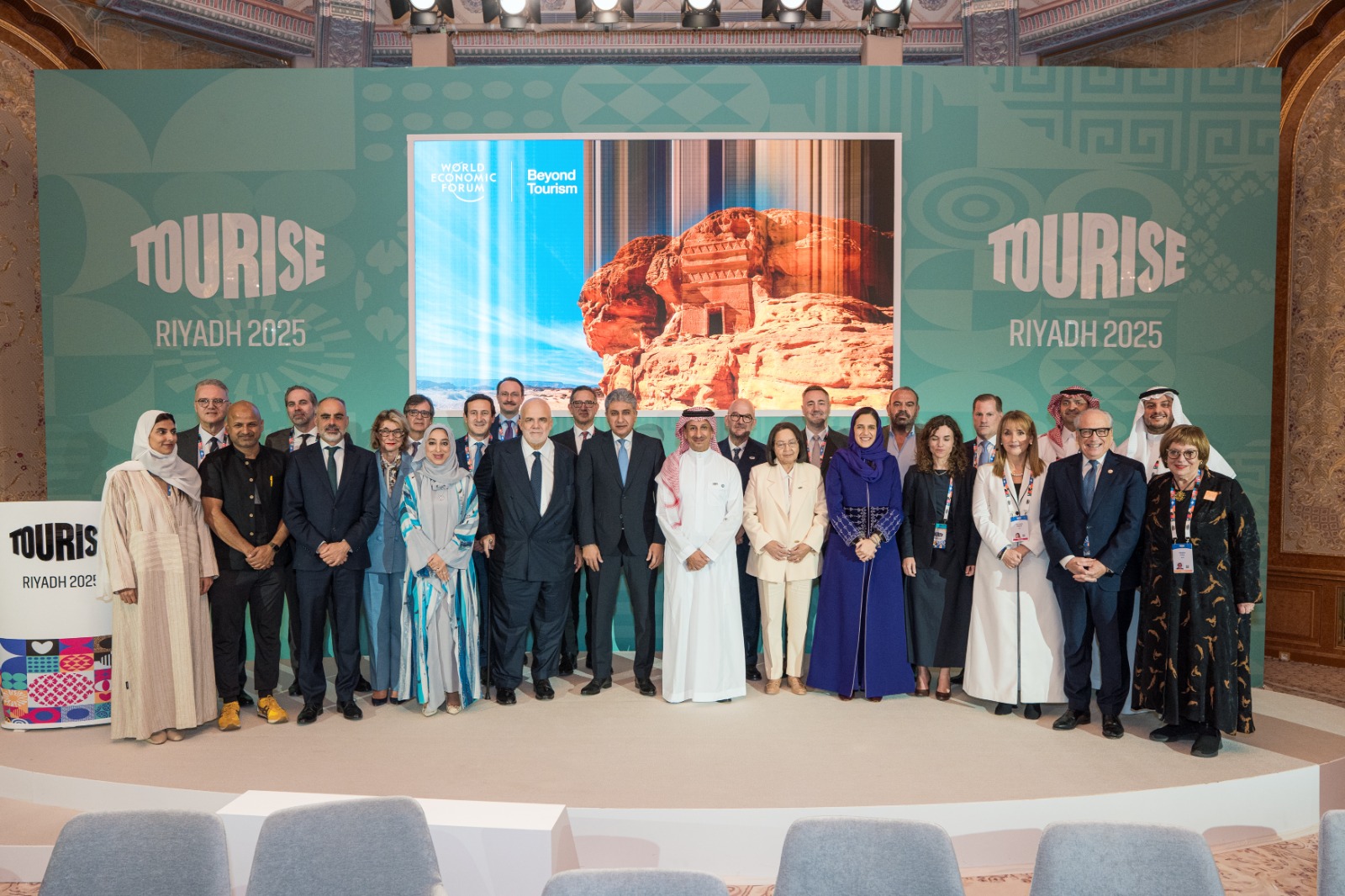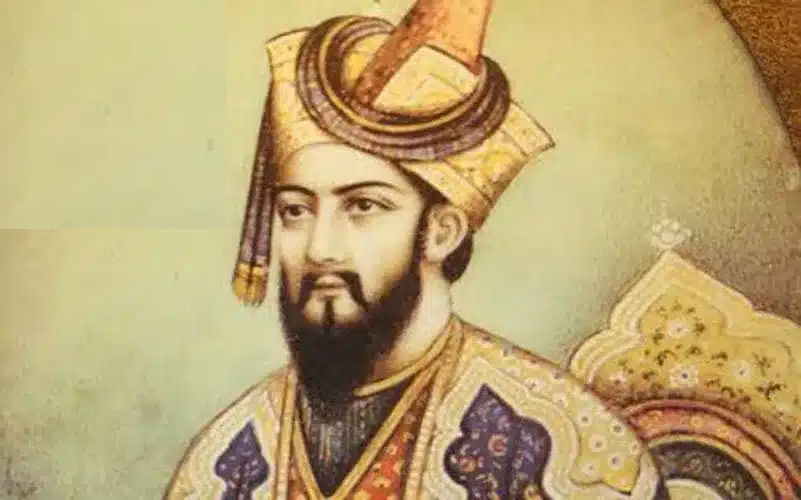
Founder of the Mughal Empire
 Naveed Ahmad Khan
Naveed Ahmad Khan
Bābur is a Persian word meaning in English “Tiger” in Urdu Cheetah (چیتا) . Bābur was born February 15, 1483 in Fergana, Uzbekistan and died December 26, 1530, Agra. India. Bābur founder of the Mughal dynasty of northern India and was the emperor 1526–30.Bābur, a descendant of the Mongol conqueror Genghis Khan and also of the Turkic conqueror Timur (Tamerlane), was a military adventurer, a soldier of distinction, and a poet and diarist of genius, as well as a statesman.
Ẓahīr-ud-Dīn Muḥammad Bābur was a soldier of distinction, a poet, a diarist, a statesman, a military adventurer.
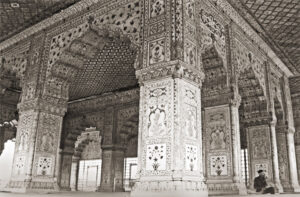
Bābur came from the Barlas tribe of Mongol origin, but isolated members of the tribe considered themselves Turks in language and customs through long residence in Turkish regions. Hence, Bābur, though called a Mughal, drew most of his support from Turks, and the empire he founded was Turkish in character. His family had become members of the Chagatai clan, by which name they are known. He was fifth in male succession from Timur and 13th through the female line from Genghis Khan. Bābur’s father, ʿUmar Shaykh Mīrzā, ruled the small principality of Fergana to the north of the Hindu Kush mountain range. Because there was no fixed law of succession among the Turks, every prince of the Timurids—the dynasty founded by Timur—considered it his right to rule the whole of Timur’s dominions. Those territories were vast, and, hence, the princes’ claims led to unending wars. The Timurid princes, moreover, considered themselves kings by profession, their business being to rule others without observing too precisely whether any particular region had actually formed a part of Timur’s empire. Bābur’s father, true to that tradition, spent his life trying to recover Timur’s old capital of Samarkand (now in Uzbekistan), and Bābur followed in his footsteps. The qualities needed to succeed in that dynastic warfare were the abilities to inspire loyalty and devotion, to manage the turbulent factions often caused by family feuds, and to draw revenue from the trading and agricultural classes. Bābur eventually mastered them all, but he was also a commander of genius.
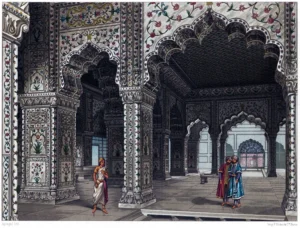
Bābur came from the Barlas tribe of Mongol origin, but isolated members of the tribe considered themselves Turks in language and customs through long residence in Turkish regions. Hence, Bābur, though called a Mughal, drew most of his support from Turks, and the empire he founded was Turkish in character. His family had become members of the Chagatai clan, by which name they are known. He was fifth in male succession from Timur and 13th through the female line from Genghis Khan. Bābur’s father, ʿUmar Shaykh Mīrzā, ruled the small principality of Fergana to the north of the Hindu Kush mountain range. Because there was no fixed law of succession among the Turks, every prince of the Timurids—the dynasty founded by Timur—considered it his right to rule the whole of Timur’s dominions. Those territories were vast, and, hence, the princes’ claims led to unending wars. The Timurid princes, moreover, considered themselves kings by profession, their business being to rule others without observing too precisely whether any particular region had actually formed a part of Timur’s empire. Bābur’s father, true to that tradition, spent his life trying to recover Timur’s old capital of Samarkand (now in Uzbekistan), and Bābur followed in his footsteps. The qualities needed to succeed in that dynastic warfare were the abilities to inspire loyalty and devotion, to manage the turbulent factions often caused by family feuds, and to draw revenue from the trading and agricultural classes. Bābur eventually mastered them all, but he was also a commander of genius.
For 10 years (1494–1504) Bābur sought to recover Samarkand and twice occupied it briefly (in 1497 and 1501). But in Muḥammad Shaybānī Khan, a descendant of Genghis Khan and ruler of the Uzbeks beyond the Jaxartes River (ancient name for the Syr Darya), he had an opponent more powerful than even his closest relatives. In 1501 Bābur was decisively defeated at Sar-e Pol and within three years had lost both Samarkand and his principality of Fergana. There was always hope at that time, however, for a prince with engaging qualities and strong leadership abilities. In 1504 Bābur seized Kabul (Afghanistan) with his personal followers, maintaining himself there against all rebellions and intrigues. His last unsuccessful attempt on Samarkand (1511–12) induced him to give up a futile quest and to concentrate on expansion elsewhere. In 1522, when he was already turning his attention to Sindh (now a province in Pakistan) and India, he finally secured Kandahār, a strategic site (now in Afghanistan) on the road to Sindh.
When Bābur made his first raid into India in 1519, the Punjab region (now divided between the Indian state and the Pakistani province) was part of the dominions of Sultan Ibrāhīm Lodī of Delhi, but the governor, Dawlat Khan Lodī, resented Ibrāhīm’s attempts to diminish his authority. By 1524 Bābur had invaded Punjab three more times but was unable to master the tangled course of Punjab and Delhi politics sufficiently enough to achieve a firm foothold. Yet it was clear that the Delhi sultanate was involved in contentious quarreling and ripe for overthrow. After mounting a full-scale attack there, Bābur was recalled by an Uzbek attack on his Kabul kingdom, but a joint request for help from ʿĀlam Khan, Ibrāhīm’s uncle, and Dawlat Khan encouraged Bābur to attempt his fifth, and first successful, raid.
Setting out in November 1525, Bābur met Ibrāhīm at Panipat, 50 miles (80 km) north of Delhi, on April 21, 1526. Bābur’s army was estimated at no more than 12,000, but they were seasoned followers, adept at cavalry tactics, and were aided by new artillery acquired from the Ottoman Turks. Ibrāhīm’s army was said to number 100,000 with 100 elephants, but its tactics were antiquated and it was dissentious. Bābur won the battle by coolness under fire, his use of artillery, and effective Turkish wheeling tactics on a divided, dispirited enemy. Ibrāhīm was killed in battle. With his usual speed, Bābur occupied Delhi three days later and reached Agra on May 4. His first action there was to lay out a garden, now known as the Ram Bagh, by the Yamuna (Jumna) River.
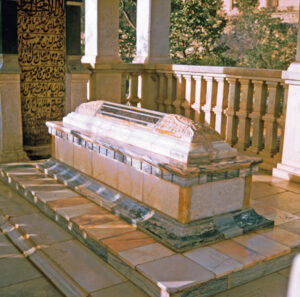 That brilliant success must have seemed at the time to be of little difference from one of his former forays on Samarkand. His small force, burdened by the oppressive weather and located 800 miles (1,300 km) from their base at Kabul, was surrounded by powerful foes. All down the Ganges (Ganga) River valley were militant Afghan chiefs, in disarray but with a formidable military potential. To the south were the kingdoms of Malwa and Gujarat, both with extensive resources, while in Rajasthan Rana Sanga of Mewar (Udaipur) was head of a powerful confederacy threatening the whole Muslim position in northern India. Bābur’s first problem was that his own followers, suffering from the heat and disheartened by the hostile surroundings, wished to return home as Timur had done. By employing threats, reproaches, promises, and appeals, vividly described in his memoirs, Bābur diverted them. He then dealt with Rana Sanga, who, when he found that Bābur was not retiring as his Turkish ancestor had done, advanced with an estimated 100,000 horses and 500 elephants. With most of the neighbouring strongholds still held by his foes, Bābur was virtually surrounded. He sought divine favour by abjuring liquor, breaking the wine vessels and pouring the wine down a well. His followers responded both to that act and his stirring exhortations and stood their ground at Khanua, 37 miles (60 km) west of Agra, on March 16, 1527. Bābur used his customary tactics—a barrier of wagons for his centre, with gaps for the artillery and for cavalry sallies, and wheeling cavalry charges on the wings. The artillery stampeded the elephants, and the flank charges bewildered the Rajputs (ruling warrior caste), who, after 10 hours, broke, never to rally under a single leader again.
That brilliant success must have seemed at the time to be of little difference from one of his former forays on Samarkand. His small force, burdened by the oppressive weather and located 800 miles (1,300 km) from their base at Kabul, was surrounded by powerful foes. All down the Ganges (Ganga) River valley were militant Afghan chiefs, in disarray but with a formidable military potential. To the south were the kingdoms of Malwa and Gujarat, both with extensive resources, while in Rajasthan Rana Sanga of Mewar (Udaipur) was head of a powerful confederacy threatening the whole Muslim position in northern India. Bābur’s first problem was that his own followers, suffering from the heat and disheartened by the hostile surroundings, wished to return home as Timur had done. By employing threats, reproaches, promises, and appeals, vividly described in his memoirs, Bābur diverted them. He then dealt with Rana Sanga, who, when he found that Bābur was not retiring as his Turkish ancestor had done, advanced with an estimated 100,000 horses and 500 elephants. With most of the neighbouring strongholds still held by his foes, Bābur was virtually surrounded. He sought divine favour by abjuring liquor, breaking the wine vessels and pouring the wine down a well. His followers responded both to that act and his stirring exhortations and stood their ground at Khanua, 37 miles (60 km) west of Agra, on March 16, 1527. Bābur used his customary tactics—a barrier of wagons for his centre, with gaps for the artillery and for cavalry sallies, and wheeling cavalry charges on the wings. The artillery stampeded the elephants, and the flank charges bewildered the Rajputs (ruling warrior caste), who, after 10 hours, broke, never to rally under a single leader again.
Bābur now had to deal with the defiant Afghans to the east, who had captured Lucknow while he was facing Rana Sanga. Other Afghans had rallied to Sultan Ibrāhīm’s brother Maḥmūd Lodī, who had occupied Bihar. There were also Rajput chiefs still defying him, principally the ruler of Chanderi. After capturing that fortress in January 1528, Bābur turned to the east. Crossing the Ganges, he drove the Afghan captor of Lucknow into Bengal. He then turned on Maḥmūd Lodī, whose army was scattered in Bābur’s third great victory, that of the Ghaghara, where that river joins the Ganges, on May 6, 1529. Artillery was again decisive, helped by the skillful handling of boats.
Bābur’s dominions were now secure from Kandahār to the borders of Bengal, with a southern limit marked by the Rajput desert and the forts of Ranthambore, Gwalior, and Chanderi. Within that great area, however, there was no settled administration, only a congeries of quarreling chiefs. An empire had been gained but still had to be pacified and organized. It was thus a precarious heritage that Bābur passed on to his son Humāyūn.
In 1530, when Humāyūn became deathly ill, Bābur is said to have offered his life to God in exchange for Humāyūn’s, walking seven times around the bed to complete the vow. Humāyūn recovered and Bābur’s health declined, and Bābur died the same year.
Bābur is rightly considered the founder of the Mughal Empire, even though the work of consolidating the empire was performed by his grandson Akbar. Bābur, moreover, provided the magnetic leadership that inspired the next two generations.
Bābur was a military adventurer of genius and an empire builder of good fortune, with an engaging personality. He was also a gifted Turki poet, which would have won him distinction apart from his political career, as well as a lover of nature who constructed gardens wherever he went and complemented beautiful spots by holding convivial parties. Finally, his prose memoirs, the Bābur-nāmeh, have become a renowned autobiography. They were translated from Turkish into Persian in Akbar’s reign (1589), were translated into English, Memoirs of Bābur, in two volumes, and were first published in 1921–22. They portray a ruler unusually magnanimous for his age, cultured, and witty, with an adventurous spirit and an acute eye for natural beauty.
